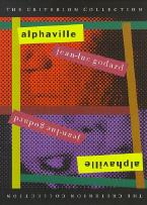
Arch
443/646: Architecture and Film
Winter 2014
Alphaville
 |
Arch
443/646: Architecture and Film Alphaville |
|
Discussion Questions:
Please answer the questions below. Use paragraph form. Undergrad answers should be around 400 words. Grad answers should be around 600 words and also include references indicating some research. Responses are to be submitted to the proper folder in our LEARN Dropboxes. I will be posting these each week after the class. You should be prepared to deliver your answer in class -- but paraphrase, do not read it. In this first set of questions we are going to explore the general interpretation of the course theme of "icons + f/x" as we see it expressed in the films. Log-in to LEARN: here |
updated 23-Apr-2014 10:25 PM
| 1. Kim Adamek | ||
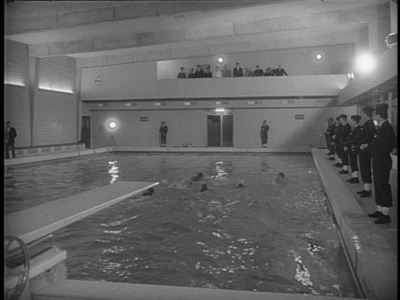 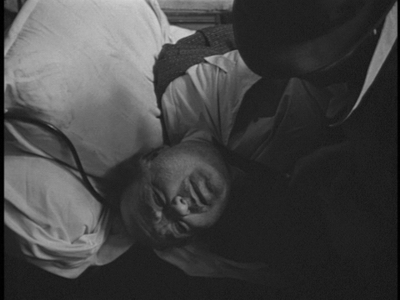 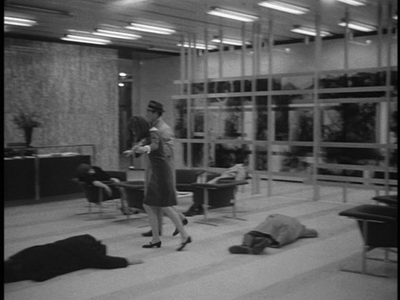 |
||
Key phrase: value of life Answer:
|
||
| 2. Hillary Chang | ||
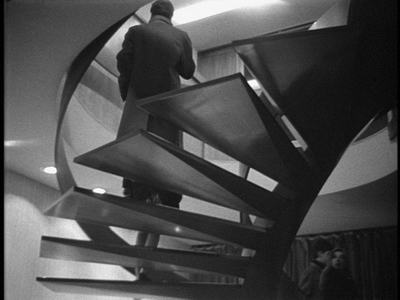 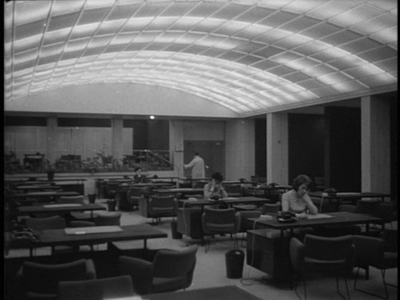 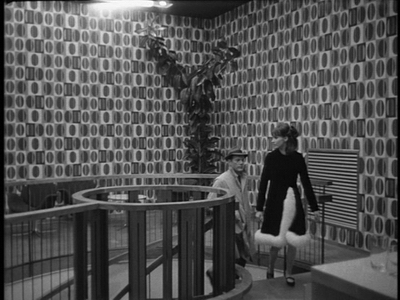 |
||
Key phrase: use of curved forms in the architecture Answer: In "Alphaville" I noticed that the use of curved forms in architecture shown in the three given images were leading to an event that would only make sense in a place like Alphaville. The first image with the curved staircase led to the meeting room where they had a presentation on the values of logic and reason over emotion; the second image was before the executions in the pool. The curved lines of the architecture leads the viewer and Caution to the strange event, the curved architecture could be showing how "warped" their society is and the dystopic nature of Alpha 60's commands. To be honest, I was left very confused by this film, and I'm not too sure if my assumptions make too much sense!
|
||
| 3. Yiu Hei Cheung | ||
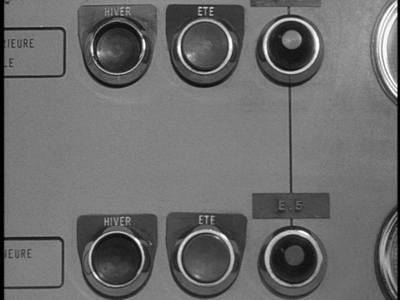 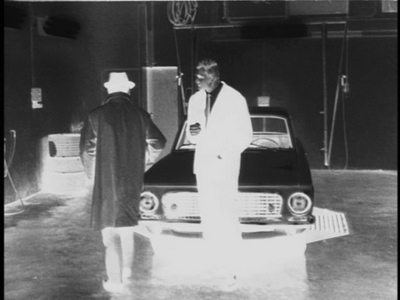 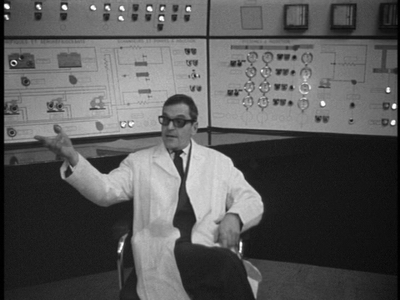 |
||
Key phrase: environment and absolute control Answer: First image: Alphaville is divided into two halves, the north and the south. The north is always in a state of winter, there's always snow. The south is in a state of summer. This is all controlled by the computer system Alpha 60, which also rules the city. Second image: As Alpha 60 begins to break down, it loses control of Alphaville's environment. This uses a switch from a positive image to a negative image to show the constant transfer from day-time to night-time. Third Image: This is the control centre of Alpha 60. Here, Professor Von Braun, the creator of Alpha 60, takes tries to convince Agent Caution to join Alphaville, offering him gold and women, and even control over a galaxy. Caution declines, holding onto his humanity, and asks the professor to come back with him. When the professor declines, he shoots him. Prior to this, Caution disrupted Alpha 60 by asking it riddles involving poetry. By killing von Braun, the only man who can fix Alpha 60, Caution ensures the destruction of Alpha 60. Alpha 60 malfunctions, it loses control of Alphaville, its climate, and it's people. |
||
| 4. Wesley Chu | ||
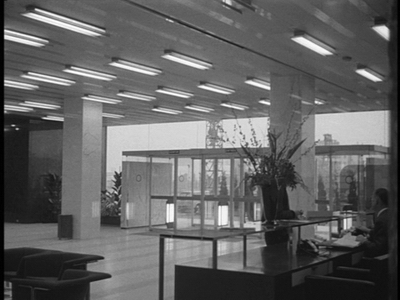 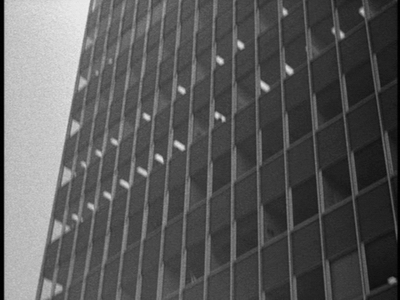 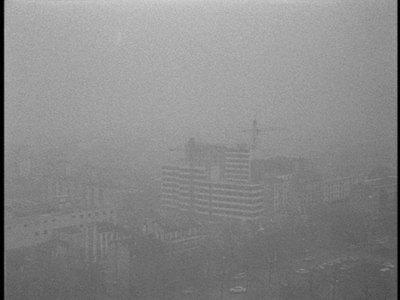 |
||
Key phrase: use of rectilinear forms in the architecture Answer: From the opening frames of the film, the rectilinear forms in Jean-Luc Godard’s Alphaville mark a sense of sterile, emotionless lack of life in the form of mechanics and machinery. From wide shots of rows and rows of fluorescent lights to grids of buildings windows, the buildings always have an air of institutionalized deadness to them, in running with the theme of the state of Alphaville. Upon Lemmy Caution’s first arrival to the hotel, the shots of elevator rides and longer tracking take of a lengthy straight hallway walk immediately gives the sense of both the importance of machinery and rectilinearity in the film. Like its citizens, Alphaville’s architecture points directly towards a society that only follows mathematic logic and efficiency, with no room for human or organic forms which could compromise the structure of the lifestyle it is supported by. One interesting thing to note is that Jean-Luc Godard did not build sets for these locations, despite it being a science-fiction film set in the future. This is unusual for a film of this type, especially after seeing films such as Metropolis, which portray a dystopian future in a wholly different way. Godard chose to use existing buildings in 1960’s Paris, which brings the themes and gravitas of the film a lot closer to our reality in terms of time and space. This selective use of certain buildings which project this rectilinear property is a way of selective documenting, as the frame is always set in a way to leave out most of the cityscape that conflicts with this shape.
|
||
| x | ||
| 5. Mu Chuan Gao | ||
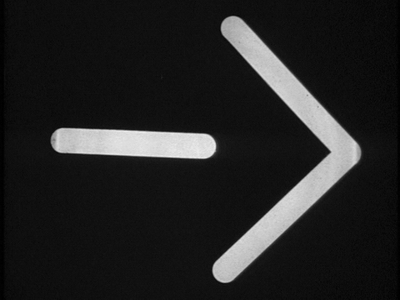 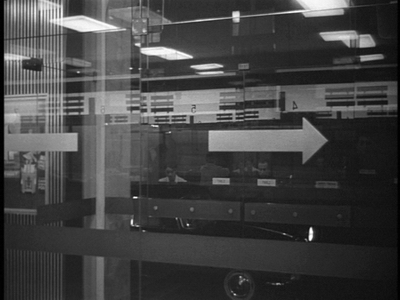 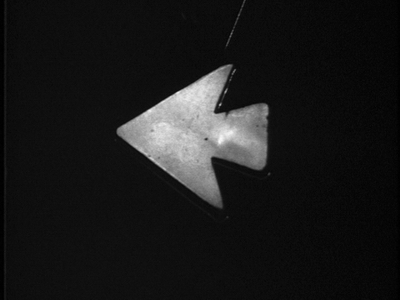 |
||
Key phrase: meaning of arrows Answer:
|
||
| 6. Maighdlyn Hadley | ||
|
||
Key phrase: close-up images Answer: The close up images in Jean-Luc Godard’s Alphaville are used to signify powerful moments in the plot. They always appear as an isolated, cut-to shot at the beginning of a scene, and create the subliminal direction for the action that unfolds afterward. The main themes of the close-ups are neon signage spelling out “NORD”, “SUD”, and various mathematical formulas, and when Lemmy falls in love, Natasha’s eye. In the scenes which feature of close ups of Alpha 60, the light that acts as its “eye”, and the disconnected fan, reinforce the industrial, cold and relentless nature of Alpha 60, an autonomous power reminiscent of 2001: A Space Odyssey’s HAL or IT from A Wrinkle in Time. The close up in action scenes, such as the shot of the knife and the apple, Godard is able to insinuate a stabbing or gunshot without having to deal with the resultant special effects required. These close-ups are showing something in a powerful way, without making the action explicit. This is a special effect by definition, albeit a subtle one. It allows the viewer to fill in the blanks with their own imagination through visual deprivation and suggestion. This can be more effective than complicated special effects, which often require stunt doubles, sleights of hand and camera angles, without a consistently realistic payoff. This would be especially true to Godard in 1965, when there was not a lot of funding for art film – which still may be the case. As is stated in Chris Darke’s French Film Guides – Alphaville, “For Alphaville, Godard built no sets and commissioned no special effects. Having neither the budget nor the inclination to do so, he simply took to the streets of Paris in 1965 using what was to hand,” (p. 12). Godard used smart filmmaking decisions to take the place of special effects and in doing so created concise, abstract shots that allow the viewer to fill in the blanks.
|
||
| x | ||
| 7. Dan Kwak | ||
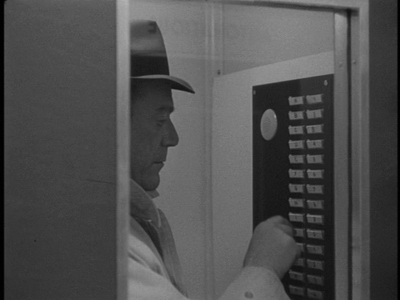 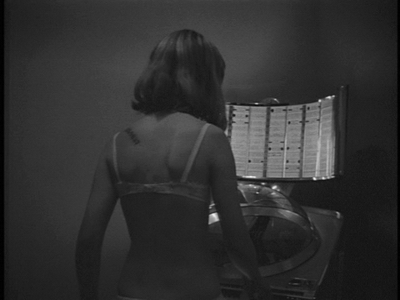 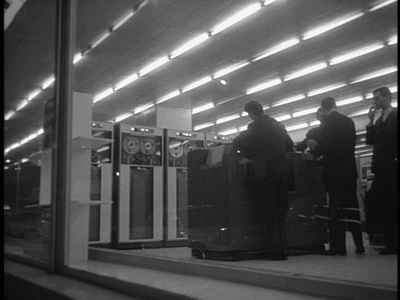 |
||
Key phrase: technology Answer: The most striking element of technology in Alphaville is the slow, grumbly, smoked voice of Alpha 60. Its strong vocal presence, its temporal speech at various places (often, repetitive of certain words such as “free”) and its narrative role precisely symbolize and depict the dark tone of the technocratic, dystopian society of Alphaville. The director personifies the technology – its persona as the prime evil force, which the protagonist is to fight against. In fact, the inhumaneness of the voice chimes with its persona well, so the audience naturally becomes adverse of its essence. Personification of the somber, authoritarian technology is a common practice in any noir science fiction. It perhaps stems from our curiosity or our deep urgency to communicate with the speechless technology in regard to its frightening degree of inventiveness, exactness and rapidity that we lack. This tendency easily depicts technology as something cold and heartless. It is our fear against technology that if it were to be personified, it must be very austere and merciless due its overpowering capabilities. However, unlike the typical tradition of any anti-technology films, the technology in Alphaville is surprisingly mundane. The small camera Larry takes photos with, the telephone (and its classic ringtone) in the hotel, the recording machines, and so on are in fact too normal even considering for the audience of 60s. In fact, the film shows exactly what is available of the period’s technology at its bareness without any further elaboration. In typical science fiction films, directors spend serious passion in dressing the technology to something futuristic and so much greater than the apparent, common technology. It is the audience’s fascination towards technology in an unimaginable form, where the inherent horror of such dehumanizes the technology. Nevertheless, the appearance of technology in Alphaville is mundane and tedious. Its appearance does not arouse any fear nor fascination in the audience. In fact, the setting of multiple microphones and lights in the “question room”, where the protagonist is interrogated, is even humorously amateurish. There is no physical robot to fight against nor any special trick of the technology that awes and horrifies the audience. This characterless technology would be a serious challenge for the characters to interact with. The only logical way the director instantly turn these mundane machines and instruments of technology into fearful being is, thus, by the voice. It is the only communication method, which the protagonist interacts with technology. It is the only means where the audience can attribute a character to this persona of technology. Thus, the harsh, monotonous and heavy-smoked voice suits the setting of the dystopian society. The genius of this lies in the ironic question the director asks the audience: is it really Alpha 60 that dictates and kills people? The voice and the machines never physically interact with the characters. Again, there is no powerful robot that shoots people – in fact, it is the inhabitants of Alphaville, who bind themselves to the rules of technology and maintains technology, who essentially establishes the dystopia. The conclusion of the narrative, where the protagonist finally wrecks Alpha 60 and people become paranoid, perhaps illustrates the modern society’s absolute dependency on technology. The irony behind the fearful, heartless entity of technology is indeed the society’s own deep-rooted fear of its dependency. The film successfully delivers this query to the audience by the mundane presence of everyday technology and the interaction with its eerie, vocal persona of technology.
|
||
| 8. Milos Mladenovic | ||
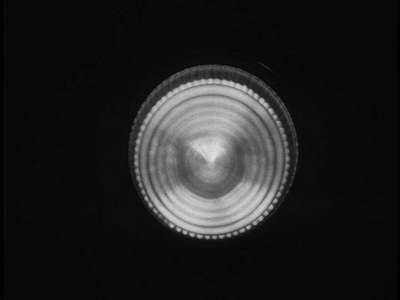 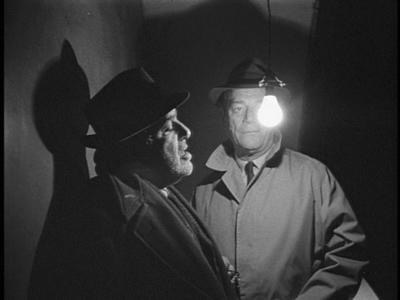 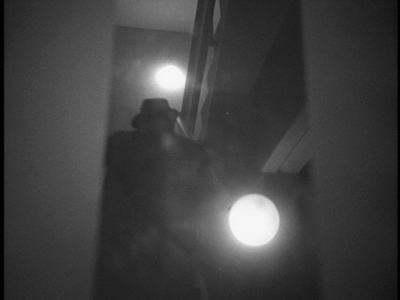 |
||
Key phrase: the use of the single bright light in set lighting Answer: The use of single bright light in the set lighting for Alphaville is one of the many elements of this film that add to its eerie, dystopian, film noir quality. The bright light flashes at the beginning of the film as the omniscient Alpha 60 is described in the subtitles and the world of Alphaville is introduced. It appears throughout the film, in the form of bright point street lights at night, stairwell lamps glaring in the foreground, and so on. In general, I believe that the bright light in set lighting is simply one of many elements in the film that work together to create its overall distinctive atmosphere. The contrast caused by the single bright lights, just like the constant cuts to symbols and close-up stills of various objects, creates a nauseous feeling, and literally makes you a bit uncomfortable at times. Often, my eyes needed to squint to bear the contrast or to make out what was occurring in the scene. As an effect, the single bright lights are one of many elements that gave the film a substantial belly and help set the general uneasy mood visually which the idea of Alphaville as a future sci-fi Parisian society does mentally. Even the fact that this was shot in Paris, but the city can hardly be distinguished in almost any of the scenes due to the stark contrast and use of dark environments with bright lights in the middle or foreground, works subtly towards an extreme effect on the viewer and overall atmosphere of the film. Looking specifically at the three images provided, the first is the image displayed often during the speech of Alpha 60, while the second and third are in the hallway of a dreary building during Lemmy's chasing of Dickson, who eventually dies making love to an expressionless seductress. I noticed specifically that these types of bright lights, in addition to creating a general sense of nausea and uneasiness for the person viewing, are often featured in scenes where a character is either chasing someone or seeking knowledge. In the latter two scenes, Lemmy Caution is chasing Dickson and getting critical information from him on the workings of Alphaville and of its creator, Professor von Braun. The lights are in scenes throughout the film where Caution is seeking to fulfill his mission of destroying Alpha 60, which he can only do through discovery and the attainment of knowledge. In this dystopian society where even the language is restricted and unknown to regular people, Caution searches for information and gradually gains the knowledge which Alpha 60 has privileged to itself. Even in one scene, the single bright light takes up the screen while Alpha 60 speaks to Caution (i.e. the first image of the image set) and discovers something itself: "You lied. Your name is [actually] Lemmy Caution." The lights eventually can be associated perhaps with moments of important discovery or acquiring of knowledge, and the search for the individual for knowledge and awareness in an oppressive society. Of course, this is in the framework of these single bright lights a s a general effect, one of many, in creating the overall mood for the film and enhancing its portrayal of a dystopian future society which makes you uneasy to view.
|
||
| 9. Arturo Enrique Morales Rivera | ||
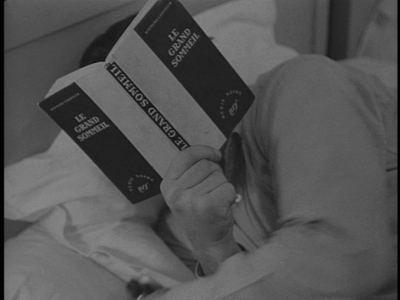  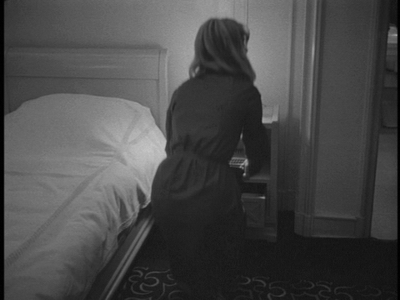 |
||
Key phrase: the written word (feel free to associate this with the use of the same in Lisbon Story) Answer: In this film, we are presented with a technologically advanced society ruled by the supercomputer Alpha 60, a creation of professor von Braun, which maintains a hard policy against conscience and the concept of individualism. Therefore, the people from Alphaville can be punished if the supercomputer detects any behavior that considers to be “illogical”, such as raising questions or showing interest in something, as well as demonstrating any signs of emotion whatsoever, resulting in their execution. It is implied in the film that any form of written communication has been banned in Alphaville, except from a book that they refer to as “the bible”, which in reality is a dictionary that is being updated continuously, removing any words that the computer may consider to evoke emotions. Historically, the destruction of the written material of any given culture is the result of either a religious, political or moral campaign to censor its contents in order to satisfy its own ambitions, which proves to be the case in Alphaville. At the same time, we are introduced to Lemmy Caution, a secret agent from the “Outlands” who targets Alpha 60 in an effort to free Alphaville from its control. Since the beginning of the film he is presented as a tough man, but as the movie progresses we get to know that he has a soft spot for poetry and novels which is, by all means, the complete opposite of what the supercomputer represents; proof of this is due to the fact that on two occasions he can be seen holding a book: the first time takes place at his hotel room near the beginning of the film, reading Le Grand Sommeil (The Big Sleep), a crime novel published in 1939 and written by Raymond Chandler. The second time, he is seen reading Capitale de la Douleur (The Capital of Pain) a book of poems by french surrealist Paul Eluard. The lack of written records of their past, as well as the continuous censorship contributed to transform the citizens of Alphaville into mindless beings that cannot experience any feelings of love or sadness, beings that can only act based on what they are told they can do, and as a result any creative outlet is non-existent. This proves to be case with Natacha von Braun -daughter of Professor von Braun- who can not remember her origins and has no recollection of what love is. During the course of the film Caution interacts with Alpha 60 on several occasions, one being an interrogation that takes place in their headquarters, with the supercomputer asking him a series of questions to which Caution responds in an almost romantic way, talking about the gifts of conscience and poetry, as if he was rebelling against the very nature of the machine, devoid from feelings and emotions. In the end, Caution manages to create a malfunction and ultimately destroy Alpha 60 by using a riddle that it cannot solve, which is interesting if you take in consideration the fact that in reality, most of the lines of the supercomputer are drawn from several essays by Jorge Luis Borges. ¹ It is then understood the importance of the written material in the development and preservation of the culture of any civilization. ¹ IMDb: http://www.imdb.com/title/tt0058898/trivia?ref_=tt_trv_trv |
||
| 10. Morgan O'Reilly | ||
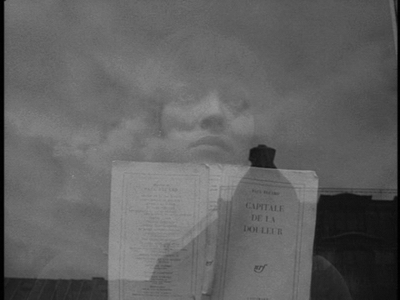 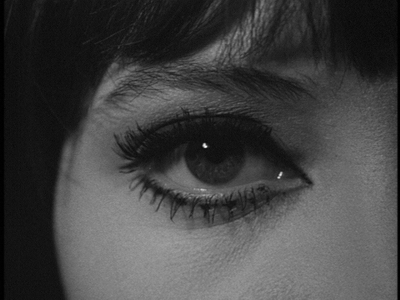 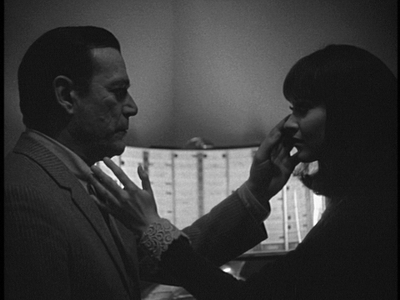 |
||
Key phrase: emotion Answer: In Godard’s film ‘Alphaville’, a dystopian city of the future is ruled by a computer called Alpha 60, which governs with relentless rationality. All that is illogical is outlawed, making emotion vehemently forbidden. Citizens who are able to show emotion are executed, while the rest are controlled to the point that they do not even comprehend what emotion is. To reflect this, everything in the film has been pared down to pure function, starting with the city itself. While Alphaville is depicted as a city of the future, the film was shot in real locations in the city of Paris. The city is featured without alteration, however this is not evident to the viewer at all, as the iconic buildings of Paris are nowhere to be seen. The alluring romantic quality that Paris is known for has been stripped away, and modern rectilinear buildings act as the backdrop to almost every scene. The absence of emotion in the spaces of the film is even more provocative knowing that the film was shot in what is considered to be the city of love. This reduction to pure basics is most disconcerting in the everyday human interactions shown in the film. The way that the citizens of Alphaville interact with Lemmy Caution, is jarring and out of the ordinary. They operate like robots, completely unaffected by the brashness with which Caution treats them. The traditional question‐response scenario is abandoned, and frequently characters inform Caution that they are “very well, thank you,” without being asked. The commonplace emotion that should be present in everyday interactions has been removed to a point that communication is absurd and mindless. Furthermore, sex is treated like a completely detached activity as women known as ‘seductresses’ offer themselves immediately and dispassionately. The robotic citizens of Alphaville become part of the overly logical setting that Caution must navigate. These awkward day‐to‐day interactions seem to correspond to the limited vocabulary which the residents have been programmed to use. This vocabulary is defined in what residents refer to as the bible, which is actually a dictionary provided in every hotel room. This dictionary is reduced regularly as Alpha 60 eliminates words that might evoke emotion. What the viewer might consider a symbol of knowledge and expression, in this film represents the crushing oppression of the governing body. In direct opposition to this purely function dictionary is poetry. Poetry plays a fundamental role in the film as it embodies rebellion against the system. It is written and read with the purpose of stirring emotion and provoking thought about the world and our place within it. In Alphaville, it is considered illogical and therefore it is contraband. People who write poetry live in the forbidden area of town and are pressured by the dictatorship to commit suicide. ‘The Capital of Pain’ by Paul Éluard is a particular book of surrealist poetry that appears in the film. Lemmy Caution discovers it in the book in the room of the agent that came before him. The transforming power of love being a fundamental principle of Surrealismi, the irrational words of this poetry becomes the language of resistance in Alphaville ii. Lemmy shares this poetry with Natacha, the daughter of the creator of Alphaville and the only citizen to exhibit signs of humanity. Significant attention is given to Natacha’s eyes in the film. This effectively indicates to the viewer the presence of Natacha’s humanity. Eyes have been called the window to the soul and are the most indicative of inner emotion. Through her relationship with Caution, Natacha’s individuality is slowly revealed. When she reads the poetry of ‘The Capital of Pain’ she unknowingly begins to question things. Her humanity it is fully realized when Lemmy Caution expresses his love for her. In this scene Natacha comes to understand the difference between sensuality and love. There is a clear transition here, as her words become poetic. The altering of her language clearly represents the breakdown of Alpha 60’s programming. Whether it is her relationship with Lemmy or the fact that she wasn’t born in Alphaville that enables her to be de‐programmed is unclear. Upon exiting the city with Lemmy, Natacha delivers the final line in the film, “I love you all.” Ultimately, despite Alpha 60’s attempts to control the city and its population by stripping it of all illogicality and individuality, human emotion prevails. i Michael Benedikt. ‘Alphaville’ & it’s Subtext in the Poetry of Paul Eluard. http://michaelbenedikt.tripod.com/godard.html ii Anuja Madan. The Language of Emotion in Godard’s Films. http://cineaction.ca/issue80sample.htm OTHER REFERENCES Crowther, Bosley. “Alphaville (1965) Screen: ‘Alphaville,’ Festival Picture, at the Paris: Godard’s Film Spoiled by Shifting Its Gears.” New York Times, October, 1965.
|
||
| 11. Patrick Rossiter | ||
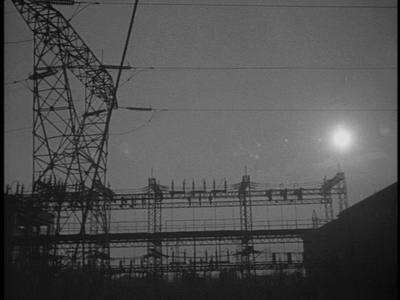 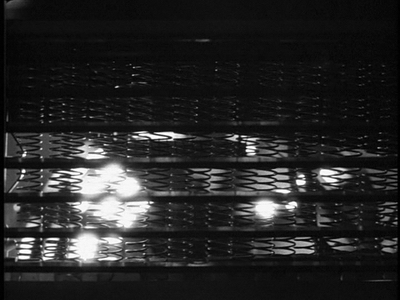 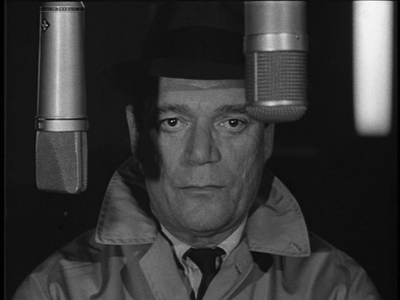 |
||
Key phrase: pervasiveness and representation of intelligence mechanisms Answer: Alphaville presented an alternate world where technology controls all aspects by means of computerized artificial intelligence known as Alpha 60 – the film attempts to depict a dystopian city of the future and does so by unconventional sci-fi film making means. In the film the future world was created by a technocracy guided by the work of advanced scientists, in particular Professor von Braun. The production of the film demanded a creative effort be put towards the depiction of a futuristic inhumane and dystopian world. The emphasis of the machine as a means to manage all human life and its activities was a key aspect to the telling of the story. This computerized version of city life needed to be communicated to the viewer. Goddard used Paris as his backdrop for the telling of the story. The city is used to create the atmosphere of a cold, inhumane, and terrible environment. There are no special effects or futuristic sets; the night-time streets of the capital becoming the streets of Alphaville, while modernist glass and concrete buildings represent the city's interiors.i Goddard used the most modern aspects of Paris to bring the story to life in a distant future. Buildings used were the Electricity Board building for the Alpha 60 computer centre and the Hotel Sofitel Paris le Scribe.ii The use of these separate spaces of Paris and stitch them together really does create a sense of place that is apart from the ancient city of Paris. This creative decision provides the mood for the film with modern architecture at the forefront. The work in Paris at the time featured modern glazed entrances to buildings and interiors which were architecturally new and interesting. The use of intelligent systems were predominantly used to create the appearance of a computer organized world, one where human emotion is absolutely condemned. A world where the Alpha 60 computer dictates information when asked and applies its artificial intelligence to all tasks. Its sentient nature allows it to almost be considered a demi-god and its control over all life within Alpha is made obvious to the viewer. As the story moves from location to location, the voice of Alpha 60 is ever present in all buildings. The use of the Alpha 60 voice provides the viewer with the understanding of the scope of intelligent control that the computer has over all the happenings in Alphaville. The mechanisms used to display the intelligence of the over-governing computer varied. Some placements of displaying this included: -The use of audio as a means of displaying the ability to recognize and understand requests. -Intelligent hallways that dictate whether a room is occupied or vacant. -Interrogation being carried out by the AI with the use of microphone looking instruments moving in and out of frame. -Hotel Rooms being served by automated systems. The representation of technology was presented through voice recognition, small props, and by automated mechanized devices. The small props were well made and served the purpose of the film. Anticipating future technology is of course not easy however the parallels between modern day voice recognition and the interaction with Alpha 60 are interestingly similar. The visual representation of intelligent mechanisms in the film is not very effective to modern audiences however the way the computerized world interacts with human life tells a story that is very relevant today. Jean-Luc Goddard was able to produce the illusion of a mechanized and intelligently interactive world with minimal props and the use of modern buildings and infrastructure. I believe this to be one of the most interesting aspects of the films production as it would go against films communicating the same concepts in modern times. i Alphaville, December 21, 2013, http://en.wikipedia.org/wiki/Alphaville_(film) ii Alphaville, December 21, 2013, http://en.wikipedia.org/wiki/Alphaville_(film)
|
||
| 12. Simone Tchonova | ||
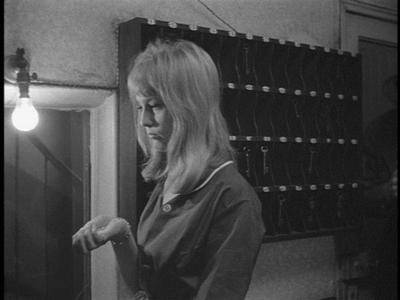 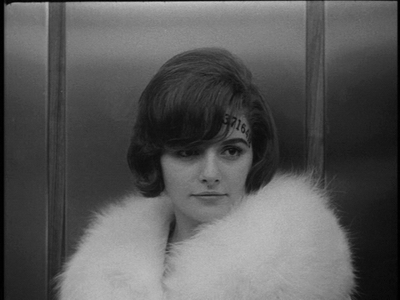 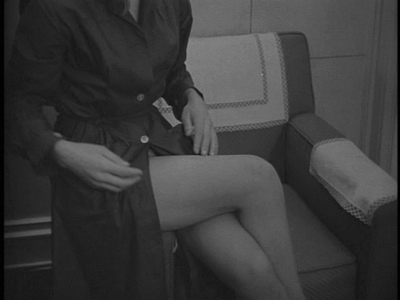 |
||
| Key phrase: pills, tattoos and sex
Answer: All three, pills, tattoos and sex are introduced quite early in the movie. When detective, Lemmy Caution, is first welcomed into his hotel room, he is shortly after provided with pills in his bathroom from a woman named Beatrice. This same woman is also there to provide sex, she calmly takes on her role as a third class seductrice. Thirdly, a tattoo of digits, is shown on Beatrice’s skin as she strips her clothing off. These three entities interlace throughout the rest of the film as an addition to the context and mood of Alphaville as a place isolated of emotion, thought, and humanism.In this first depiction at the beginning it seems they stem from one source the woman. The first object, the pills, are a recurring topic in Alphaville. The citizens of Alphaville are continuously seen taking pills. It is never fully described what these pills are for or if they differ from one another. Perhaps different pills are used for specified times of day or action. But there is a short excerpt in the beginning that mentions the need for taking something from the old planet to help better adapt to the new atmosphere. These pills are part of a daily process in everyone lives which keep them going in a world bland of emotion and adventure, Just as the citizens of A Brave New World take Soma. The tattoos on the other hand all comprise of a series of numbers. Numbers symbolize a very strict regime and order in a technologically driven universe. In our world today tattoos are used as a means of self expression and individuality. This is unlike the tattoos seen on the women of Alphaville, who have tattoos on their faces not as a self initiated art form but as the victims of WW2 had tattoos for identification. Sex on the other hand is not connected to love or emotion. Sex is offered by the seductrices as a common routine. They (the men and women) do not seem to show emotion (including excitement) on the topic of sex. There was one plump man who whilst in bed with Beatrice began to proclaim his love for her and speak of tendernes. this man was only left to die a few moments later in the same bed. In conclusion pills, tattoos, and sex are used as effects to support the bland and benign concept of Alphaville. A place where pills are taken not for self remedy or drug abuse, where tattoos are no longer a means of self expression and where sex has turned into a pragmatic action. The usage of these three solidify that Alphaville is a somewhat stoic society.
|
||
| 13. Yiming Wang | ||
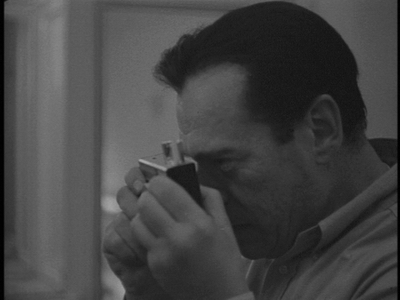 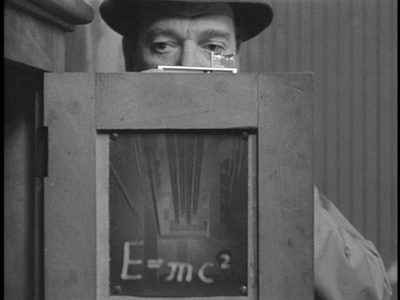 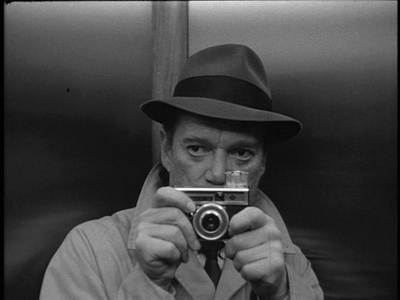 |
||
Key phrase: the photographer Answer:
|
||
| 14. Victor Zagabe | ||
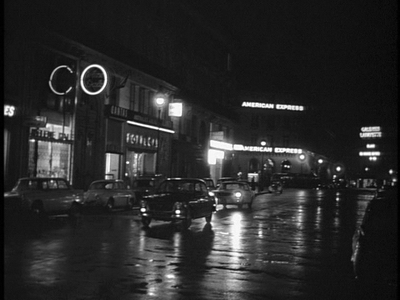 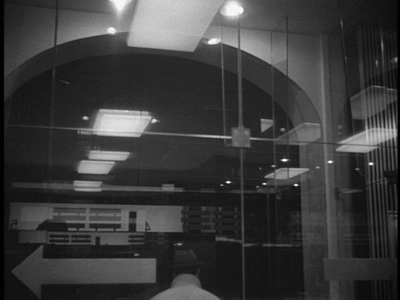 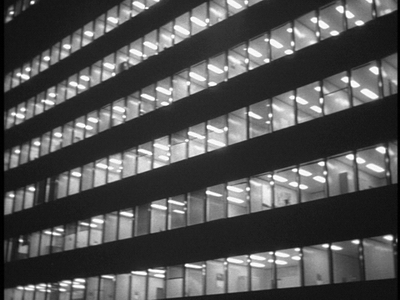 |
||
Key phrase: night lighting of the sets and reflections Answer: The use of reflections in Alphaville were such that created an illusion of continuity into infinity. The idea was to use these reflections to alter the perception of depth and project one’s ideas onto the world. When one takes a look at the second image, it becomes clear that these reflections are but a metaphor of a society that is constantly forced to look inwards, never to fully understand what reality they are escaping from. The use of night lighting, compliments this sort of masking effect in the sense that it is made bright enough for one to notice the effect of illumination, but not enough for one to distinguish individual items within the spaces. Allowing the luminescence at night to distinguish particular objects as being special would would go against the principles of the society in Alphabille. Ultimately, it was very successful, as shown in image number 3, that the use of lighting at night served to create a visual effect of one continuous massing.
|
||
| 15. Kyle Jensen | ||
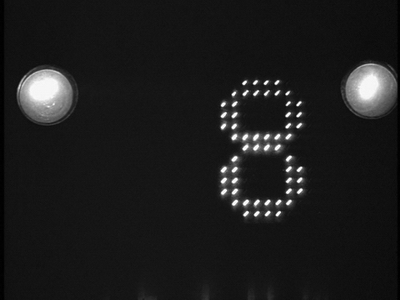 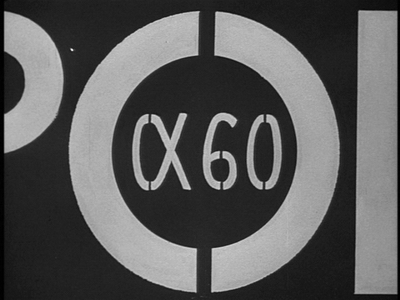 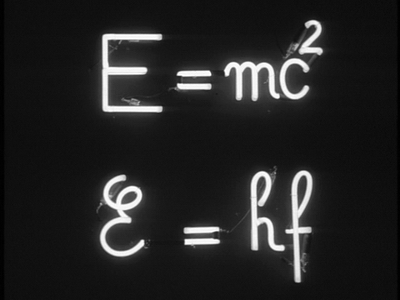 |
||
Key phrase: use of numbers Answer: Numbers were used throughout this movie in a few ways: Creating a countdown to its conclusion, as a symbol of a mind control computer, and mathematical equations showing the cultural reliance on logic. The numbers shown in the film added to the anticipation of the conclusion and helped the progression of the many parts of the film. The countdown of numbers appeared as a quick cut film effect throughout the movie. A numerical countdown from 6 all the way to one was shown closer to the beginning of the film questioning the meaning of life in the dialog. In this way the countdown was to the death or demise of humans and how easy it is to die, and acts as a reflection of the character’s mortality. As the action in the movie increased, the numbers starting at 6 appeared quickly between frames to show the progression towards the finale. I feel that this technique although somewhat dated, is effective in that it shows the key moments in the film and their progression towards the ultimate demise of the city. It creates a certain amount of tension as the viewer is anticipating the final conclusion of the movie, understanding its eventuality as the numbers continue to count down increasingly quickly towards the end. The symbol of the evil empire included an alpha symbol followed by a sixty with a circle around them. Alpha sixty is a mind controlling computer system that is manipulating the citizens of Alphaville, this technology was created by professor von Braun who is the main villain of the film. The task of the hero, Henery Dickson, is to destroy this computer system that has outlawed free thought and turned the citizens of the city into unquestioning slaves. Throughout the movie this turmoil over technology can be seen, as the film evokes a questioning quality of the value of technologies. A feeling of conspiracy theory plays a role as the idea of a society of people being controlled by technology is of the science fiction realm of entertainment. Numbers with their equitable sums are a symbol of science and technology and as the city shown in this movie are based so heavily of logic and reason it seams only fitting that numbers and counting should play such an important part in the movie. The mathematical equations e=mc2 and e=hf were used to emphasize technology’s role in the sinister happenings of the city. They appear as quick cut flashes and add a certain amount of intrigue as the technology of the film is seen to be advanced and some what mystical. Both equations show an energy equation, the first e=mc2 by Elbert Einstein is known as the mass energy equivalent conceived in 1905. The second e=hf is the equation for photoelectric effect again by Einstein who was awarded the Nobel Peace Prize for his findings in 1921. Both show advancement in the technological field of physics. The paranoia associated with technology was expressed through these mathematical equations emphasizing the technocratic dictatorship shown in the film. I feel that they chose these symbols as they may seem complicated and almost mystical, creating this worship of masters who can manipulate their laws through means of technology. It seems to me that the symbols also emphasize the logic that rules Alphaville as science and technology are held as the highest esteem.
|
||